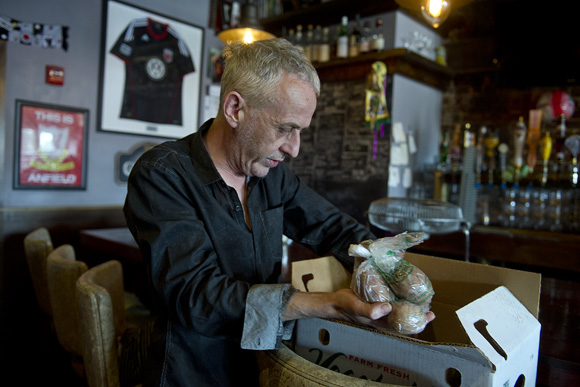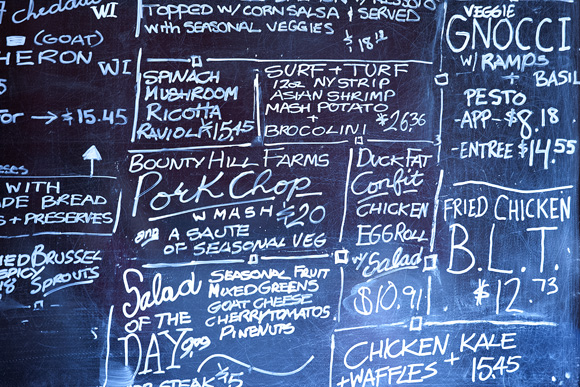Chef Ryan Gordon at the Queen Vic has started a new partnership with the farmers who provide the fresh, sustainably-grown food for his pub, and he welcomes other chefs to join in the venture.
When Ryan Gordon opened the Queen Vic on H Street NE, he wasn’t trying to be part of the locavore food movement. He was simply trying to satisfy his British wife, who longed for a good local pub like the places she knew in her home country. The idea was to provide D.C. with tasty food, good European ales and stouts on tap, and a fun place to watch soccer with others who call the sport “football.” But when some farmers from Pennsylvania showed up selling fresh produce, a partnership was born which would prompt the pub owner to begin what he now calls the “Table-to-Farm” movement.
“We’re trying to see how the restaurants can help the farmers,” Gordon says, explaining what he hopes will become a citywide program to improve the relationship between regional growers and D.C. chefs. For several years now, foodies have talked about forming direct relationships with farmers in what has become known as the “Farm-to-Table” movement. Gordon now wants those relationships to become more reciprocal, with chefs and their customers providing the farms with stable sources of capital. To begin, he has made a significant investment in a Pennsylvania farm’s hardscape and is providing a way for city dwellers to access fresh food through both his menu and a community supported agriculture program.
The whole thing began simply enough: Doreen Shank and her daughter Kimberly from Hickory Ridge Farm were delivering food to the nearby Atlas Room one summer afternoon in 2012, when they asked the chef there if he knew anyone else in the neighborhood who might want to buy their extra cherry tomatoes. Gordon was open to trying their goods; previously he’d bought from farms but wasn’t always able to get all of the fresh items he wanted.
 Farm life at Hickory Ridge Farm
Farm life at Hickory Ridge FarmOver time, the Shanks began bringing a steady stream of produce to his door, and connected Gordon with other farmers who supplied more goods from farms in Franklin County, Pennsylvania, including tasty goodies like black raspberries, rainbow-colored chard, squash blossoms, and rhubarb. Customers were delighted to have organic food on their plates as they watched sports and Gordon was glad to have a direct link to the growers.
The arrangement was also good for the farmers. Previously, many of the farmers the Shanks’ knew in Pennsylvania had tried other methods for selling their produce directly to customers.Some had tried setting up roadside stands near their properties, but weren’t able to make a steady income from it. The demand just isn’t strong enough in farm country.
“But there’s such a large demand for this kind of food in D.C.,” Shank said.
Eventually, Gordon struck up a friendship with the Shanks, often driving up to the farm to visit the family who was growing his food. On one such trip, he and Queen Vic employee Noel Quinn talked about wanting to do more to help the farmers thrive.
“We were all sitting around the fire one night talking,” Gordon said. “Restaurants have to veer away from getting local stuff during the winter months. We realized there might be a way that we could make a bigger investment in the farm that would benefit both ends.”
The Queen Vic, they decided, could pay for three large greenhouses at the farm. The farmers could then grow crops in the offseason, repaying Gordon over time with not cash, but deliveries of fresh produce.
The greenhouses, which were installed last year, provided ample fresh greens to the restaurant during some of the coldest parts of the winter, and may potentially be enhanced to provide other crops in future years.
 Noel Quinn, creative director of From Table to Farm, an initiative started by The Queen Vic restaurant on H Street NE, pulls fresh veggies out of a "Victory Box." Quinn says Table to Farm is about "celebrating good food practices"
Noel Quinn, creative director of From Table to Farm, an initiative started by The Queen Vic restaurant on H Street NE, pulls fresh veggies out of a "Victory Box." Quinn says Table to Farm is about "celebrating good food practices"Quinn and friend Brian Lounsbury are now taking the concept one step further, and with Gordon’s support, setting up a community-supported agriculture, or CSA, partnership with the farmers. This allows people in the H Street neighborhood to access to the fresh produce, and opens up a whole new customer base for the farm, allowing people to buy weekly boxes of produce they can take home to cook themselves. The pickup point is, of course, the Queen Vic.
“We’re calling the boxes ‘Victory Boxes’ after what Eleanor Roosevelt did during World War II, getting city people to grow fresh food,” Quinn explains. The boxes are a conversation starter in the restaurant and the greater community, as people are excited to tell their neighbors what they are carrying as they go down the street after a night at the pub.
Quinn and Lounsbury have begun the process of making FromTabletoFarm.org an LLC, and say they are delighted to find that their first ten CSA members have been swapping recipes and sharing cooking tips for some of the less familiar foods, such as rhubarb. Sometimes that recipe swapping happens over pintsat the bar. Other times it happens via social media.
“We’ve taught a lot of people how to eat fresh food,” says Lounsbury, who also works as a teacher at an environmental charter school in D.C.
“We’ve also been able to cut down the miles the food travels from 1,500 to less than 200,” says Quinn.

In addition to fruits and vegetables, the Queen Vic gets access to locally grown pork, beef and cheeses through the partnership’s 21 farms. The farmers also specialize in different crops; some have orchards or grow berries, while others rotate crops amongst their collective group to keep the soil from becoming exhausted.
The personal connection also allows Gordon to sit down with the growers in the spring to go through seed catalogs and make requests for some hard-to-find produce for his menu.

Quinn believes good, fresh, sustainably produced food should not be a luxury item for the rich and that direct access to farmers should not be reserved for big corporations, and so hopes to sign more restaurants on to the table-to-farm movement. Quinn and the team also believe it is the best way to give family farms a fighting chance for survival.
The customer base of the Queen Vic often includes all walks of life – from those working for the president to those who work on construction crews. Most come because they want to see a friendly face at the bar and like the idea of a place to hang out with neighbors, but return because they like the surprisingly fresh food, says Quinn.
Shank, who works her farm with husband and five children, says she believes the true definition of sustainability should include the idea of sustaining families. “This has enabled us to provide things for them year round,” she says of the Queen Vic customers. “I enjoy growing things so much that to make it a year round thing is very positive.”